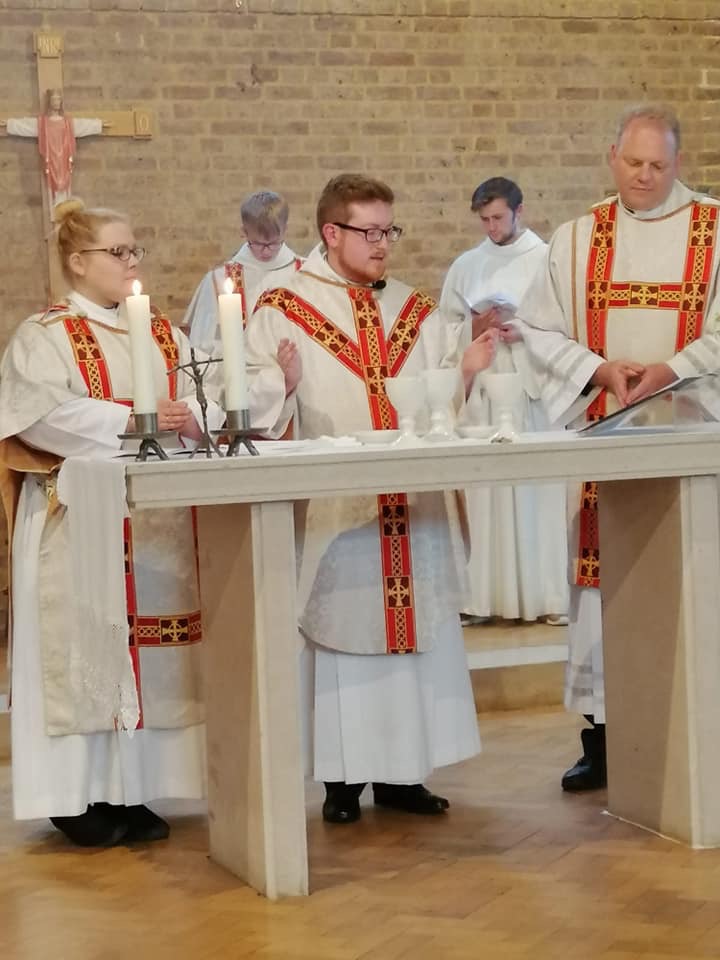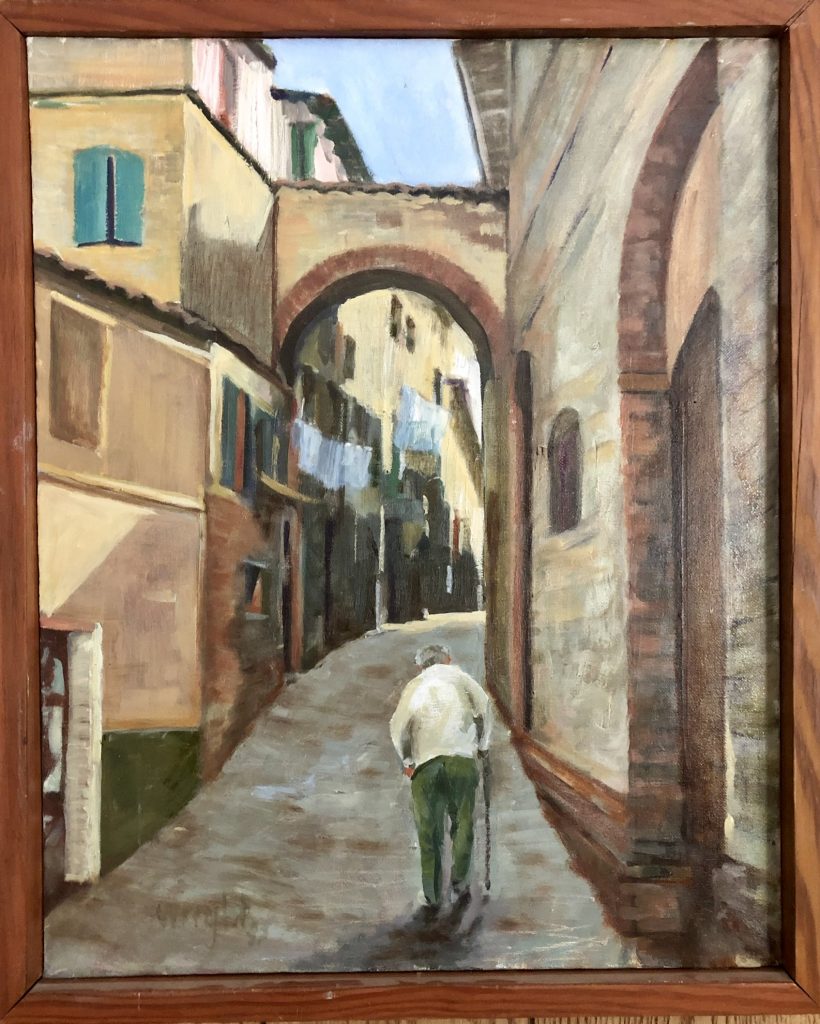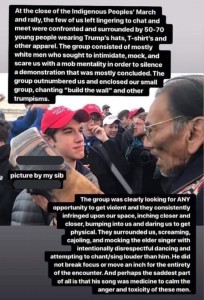The Feast of Corpus Christi
20 June 2019
The First Eucharist Celebrated by
The Rev. Danny Lee Pegg
St. Luke’s Parish, Stone Cross, Sussex, England
The Rev. Dr. Lauren R. Stanley
Superintending Presbyter, Rosebud Episcopal Mission (West), Rosebud Indian Reservation, South Dakota
In late Fall 2015, my bishop in South Dakota asked me if I would be willing to chat with a “tutor” (a what?) from Cambridge University in England who had a seminarian interested in coming to the Rosebud Indian Reservation to be my intern.
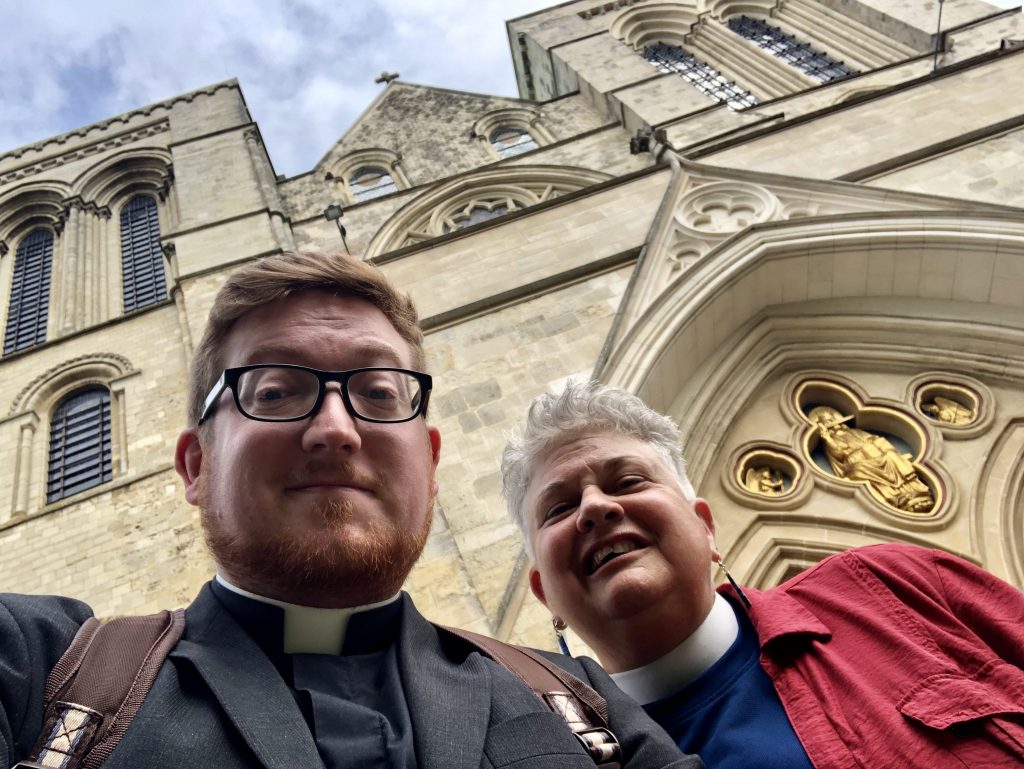
It was an odd request; I usually get my seminarians from American seminaries, and to be honest (and with great apologies, Fr. Danny), while I had at least heard of Cambridge, I had never heard of Westcott House. (And Fr. James, before you get on your high horse about me not knowing Wescott, know that I never heard of St. Stephen’s House before last Sunday, even though I think I know where that might be located …)
Because I knew of Cambridge, I thought it might be worth a try, so I wrote to the tutor, whom I actually knew from my days as a missionary in Sudan, and soon enough, I was in conversation with this delightful young man who wanted to learn about Natives on Turtle Island and was willing to serve eight congregations in an extremely rural area beyond what we call the back of beyond. (We Americans are very good about being remote … and beyond the back of beyond is beyond even remote.)
Nine months later, Danny Pegg arrived on the Rosebud, and learned about all sorts of things, like how to drive for miles and miles from church to church to church each Sunday; how to stand up for righteous reasons against oil companies desecrating sacred land and water; how to put up a tipi as only the Lakota – what y’all refer to as the “Sioux” – can do; how to split firewood to care for grandmothers, and lead wakes and funerals and say prayers spontaneously and eat wojapi, a sort of fruit pudding that is, in Lakota culture, the food of Wakantanka, the Holy Mystery that is the Lakota name for God, and even how to eat a few other things that we won’t describe in detail here tonight.
Our time together is what led me to be with you tonight, as we celebrate not only Danny’s ordination to the priesthood on Sunday, but also his first Eucharist, on this Feast of Corpus Christi, the day we celebrate the institution of Holy Communion.
[Now, being an American, I know that I’m speaking to you in a somewhat foreign tongue, so I ask y’all to forgive me if on occasion, I use words that might not be in your English language.
[Like “y’all.” Which most people think means “you” plural, but really doesn’t. “Y’all,” where I come from, means one of you, or a few of you, or you in general, or “you” and your immediate kin.
[Where I come from, it does not mean “everybody.”
[That’s all y’all.
[I tell y’all this because at some point tonight, it’s going to be important, and all y’all will get it.
[(And yes, there will be a test on this later on …)]
Now, Danny asked me to come here tonight to preach because we had such a deeply important time together on the Rosebud and up protesting on the Standing Rock, a time that helped form him to be the priest he is to y’all – to all y’all – today.
And I am here because Danny knows how important the Eucharist is to me. I’ve been a priest for 21-plus years, and I have celebrated the Eucharist in great cathedrals and under thorn trees, in refugee camps and urban centers, with archbishops and refugee children, with my own kin (kin – y’all know that means me and mine, right?) – and with complete strangers, with freshly baked bread and fine port, and with animal crackers and undiluted fruit juice concentrate. I’ve celebrated in the backseats of cars on freezing cold days (as in, 30 below zero Fahrenheit), and on blistering hot days (as in, 105 degrees Fahrenheit). I have celebrated the Eucharist in just about every context y’all can think of, and a whole lot more y’all can’t hardly believe. (Translation: Unimaginable.)
And now, tonight, it is Danny’s turn.
It is his turn to do one of the holiest things he will ever do in his life – he will stand at that table, and he will hold up the bread and say, “Take. Eat. This is my body,” and he will lift the cup and say, “Drink this, all of you. This is my blood of the new covenant.”
He will say, “Do this in remembrance of me.”
And when he does that, he will be changed … he will be a different person – to himself, to God and to all y’all.
Because let me tell you – let me assure you – y’all will never look at him in the same way again.
The one who celebrates the Eucharist, who presents to y’all and to God the bread and the wine and asks God to send down the Holy Spirit so that that bread and wine is not just bread and wine but is – in some way which we cannot and do not need to understand – the body and blood of our Lord Jesus Christ … the one who does that is not the same as he or she was before. He is different. He is set apart. By his very words and actions, he becomes a symbol of the holy to us.
That, my young friend, is what is about to happen to you.
It is a holy, dangerous and completely wild undertaking, and I’m going to tell you right now: Don’t you ever take it for granted.
Let me try to explain this holiness (not that we really can explain it, but Danny did ask me to come a very long way to be here, so let me at least try …)
You see this?
THIS is communion bread, what y’all’s priests refer to here as the concelebration host.
It is made up of wheat flour and water. That’s it. Wheat flour and water.
It is plain. It is dry. It goes bad quickly (just leave it sitting out in the air sometime, and you’ll see …)
This whole host contains, oh, about 40 calories.
That’s all it is.
Bread.
And not the good chewy bread that fills your mouth and strengthens you and makes you say to your neighbor, “Now that’s good bread.”
It’s … plain.
THAT bread that we will have up there, at the altar, after Danny consecrates it?
It may look the same, but trust you me (that’s another Southern expression, trust you me…) IT. IS. NOT. THE SAME.
Because THAT bread is the bread of life.
THIS bread? Once it is broken, it will give you just enough calories, barely, to breathe. To literally breathe. Inhale. Exhale. That’s it.
THAT bread? THAT bread will give you enough calories, enough life, to change the world.
THIS bread? (Inhale. Exhale.)
THAT bread? Move mountains.
THIS bread? (Inhale. Exhale.)
THAT bread? Bring the dead to life.
THIS bread? (Inhale. Exhale.)
THIS bread is like the manna that fell from heaven to keep the Israelites alive in the wilderness. And manna, my friends, is not really what y’all would call “bread.” Because manna is really nothing more than excretions from plant lice that live in the desert and feast on tamarisk trees. (Yes, the bread from heaven that kept the Israelites alive for 40 years in the wilderness was bug poop …)[1]
THAT bread? It will fill you and sustain you and strengthen you and give you the courage and endurance and everything else y’all will ever need to do all God is calling all y’all to do.
Do you see the difference?
THIS bread is nothing but a few calories that will allow you to survive for but a few short minutes. I could break it up and it would be, for us, just a snack.
But THAT bread – THAT bread is LIFE.
And once THAT bread is consecrated – not really by Danny, even though that’s what we say, but by God on high – it becomes the Body of Christ.
And THAT, my friend, is when the holiness happens.
NOT at the consecration – although that is holy in and of itself, and should never be taken for granted.
No. The real holiness comes when we, the Body of Christ, come forward as the Body of Christ to meet the Body of Christ in its most intimate form.
Let me say that again: The real holiness comes when we, the Body of Christ, come forward as the Body of Christ to meet the Body of Christ in its most intimate form.
What we are doing here especially tonight, on this Feast of the Body of Christ, is engaging in an intimate, loving encounter with love itself.
Which is why Danny can never take this for granted.
And it is why all y’all can never take communion for granted, either.
Because THAT bread is NOT THIS bread.
THAT bread is the fullness of all of the love that God has for each and every one of us, all the incredible, radical, wild, never-ending, world-changing, life-altering, life-giving love that God freely gives to each one of us.
THAT bread – taken, blessed, broken and given – is THE bread of life, THE bread of love, THE great gift that God gives us freely and recklessly, over and over again.
Now, let me ask y’all something:
Why do y’all think God gives us this bread, every single day, over and over again, whenever we want it, whenever we need it? You think it’s just because God wants us to survive one more day, to draw one more breath?
NO!!!!
God gives us this bread so we can DO something with it!
It is not enough to simply come to church once a week and get our little nibble and then go home again and pretend that that’s that.
God gives us THAT bread so that we have the strength and courage and power and nourishment to go out into the world and do all the things that God is asking us to do:
To feed the hungry and Give water to the thirsty
to give Voice to the voiceless and hearing to the deaf and sight to the blind
To make the lame leap for joy and the dead come to life.
To set the prisoner free and include the excluded and touch the untouchable.
To love the unloved
THAT bread is so powerful that with it, you will change the world.
THAT bread will give you the strength to stand up to a world that says, “I got mine and I don’t care if you ever get yours,” and say in return, “Not today, Satan. Today everybody gets what they need, everybody eats, everybody is loved and welcomed and celebrated.”
So … let me sum this up for you:
THIS bread? A snack. And not a very good one at that.
THAT bread? Love. Life. Holiness.
Got it? Good.
Now, David, do me a favor and open those back doors, please. Let the world in for all of us to see.
And Danny, I need you come here please, to receive your charge:
My friend. My brother in Christ. You have been called by God to nourish and strengthen the people whom God has placed in your trust so that together, all y’all can go out into that world you see to do all that God calls all y’all to do. You are to do this through prayer, and through the regular feeding of your people. You listen to me, son: Do not EVER presume that you can do this easily. Do not EVER think you can fall out of bed to land at that table. Do not EVER believe you can simply say some pretty words and wave your hands in a pretty manner, and that that will be enough. You take this calling from God seriously, Danny. EVERY time you stand at that table – or anywhere else – you remember: This is holy stuff you’re doing. This is wild stuff. This is dangerous stuff. Because you, on behalf of God, are feeding God’s beloved children with God’s very self so that together, all y’all can do all the things God needs all y’all to do. You are playing with fire, son. So, please … be faithful to this call. Always.
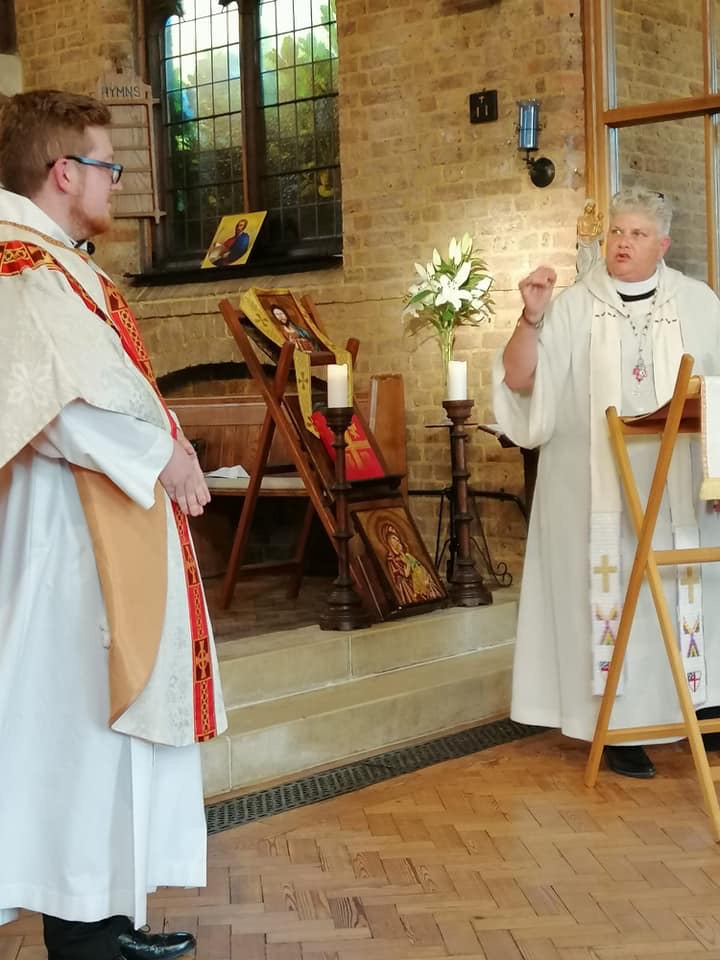
And now, my friends, I’m asking all y’all to stand, and to look out those doors into your world, as all y’all receive your charge:
My friends. My sisters and brothers in Christ. Y’all – all y’all – are the Body of Christ. Y’all are the hands and feet and arms and legs and heart and soul and mind and voice of the Risen Lord in this world. Y’all have been called to stand up in this broken, hungry, fear-filled world and proclaim God’s good news by word and deed. And as the Body of Christ, you are given the great gift of coming forward to meet the Body of Christ, to be nourished by the Body of Christ, to be strengthened by the Body of Christ so that all y’all can do everything Christ asks of you. Do not EVER presume that THAT bread is just a snack. Do not EVER come to the table willy-nilly. Do not EVER forget that y’all are playing with fire every single time you receive the Body of Christ. Go into your world, my friends, knowing that you have been fed with the very love of God, which y’all received as the Body of Christ from the Body of Christ. God needs all y’all in this world. So, please … be faithful to y’all’s call as well. Always.
Amen.
[1] Barbara Brown Taylor, Bread of Angels, 1987, p. 9
